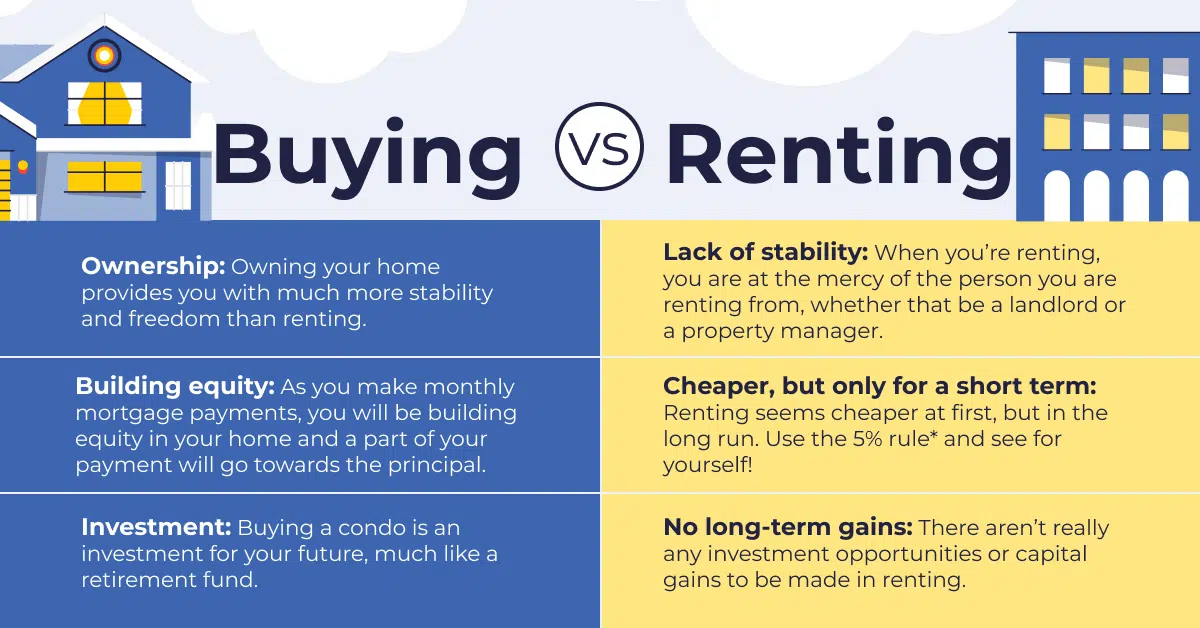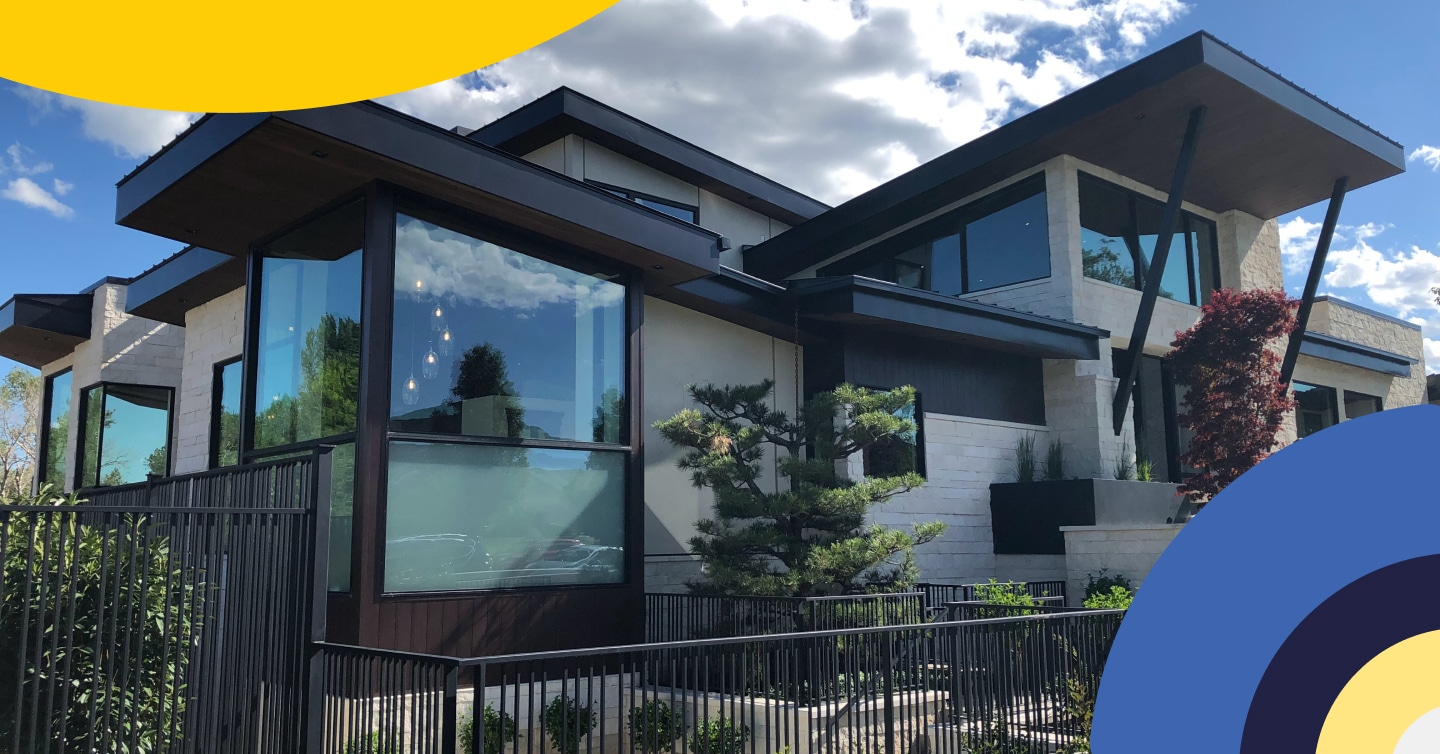Featured articles #Real Estate
Featured articles #Real Estate
Is It Better to Buy or Rent in Toronto?

Table of contents
The decision to buy or rent a home in Toronto is significant and largely depends on your personal situation and what you want to achieve financially. While renting offers flexibility and lower upfront costs, homeownership provides stability and the chance to build equity, and you benefit from potential long-term gains.
To determine the best path for you, weigh the pros and cons of each option, considering your finances, lifestyle, and the current state of the housing market.
Key Takeaways
- Renting provides flexibility and lower upfront costs.
- Buying offers stability and potential long-term gains.
- The 5% rule can help determine if renting or buying is more financially advantageous by comparing costs.
Renting a Home
For some, renting is more convenient and appealing because of its flexibility and lower upfront costs. Others find the lack of stability and long-term financial gains to be deal-breakers. Let’s examine the pros and cons of renting a home.
Pros of Renting
Flexibility
If you don’t plan on staying in the same place for long, renting gives you more flexibility to move since leases are shorter-term commitments, usually no more than a year. If you prefer to move often, renting may be more suitable since you aren’t locked into a specific neighbourhood or city as you would be with homeownership and a mortgage.
Maintenance
When you’re renting, your landlord or property manager is responsible for the maintenance of the property. This saves you time and the headache of hiring someone to complete repairs if something goes wrong. If the home requires repairs or maintenance, you simply contact your landlord or property manager to take care of it. You also won’t need to budget and pay out of pocket for these extra expenses.
Save Money
In the short term, renting is much cheaper than owning a home. There’s a reason renting is the more affordable option for households with lower incomes. You aren’t required to make a large down payment; you just need the first and last month’s rent for your deposit, which is significantly cheaper. Even if you can afford to buy, it is not always an investment everyone wants to make, and renting can allow you to diversify your investments while keeping them more liquid than if you invested in real estate.
Cons of Renting
Lack of Stability
When renting, you are at the mercy of the person you rent from, whether a landlord or a property manager. Any alterations to the space typically need to be approved by the landlord, who may not allow you to paint or make any other alterations to improve your living space. You may risk losing your home if your landlord sells to someone who wants to move in. Renovictions, while not legal, are common in the city for those who pay below-market rents.
Rental Increases
Rent typically increases each year. If you live in a rent-controlled building, rent can increase yearly to account for inflation, and landlords can apply for above-limit increases in some circumstances, which could increase the amount you are required to pay. If you rent in a place that isn’t covered by rent controls, the landlord can increase your rent however much they want as long as they only do it once a year. This can easily make renting unaffordable, pricing you out of your home if the rent is increased significantly from one year to the next.
No Long-term Gains
Unless your rent is exceptionally cheap compared to mortgage payments, there are no investment opportunities or capital gains from renting. While initially more affordable, renting brings you no long-term returns. Considering the investment opportunity and capital gains associated with home buying, long-term renting is not the cheapest option unless you can commit to investing your money that produces similar returns compared to real estate appreciation.
Buying could be the best option for you–
Download our full report below to find out!
Owning a Home
Some find homeownership more appealing, while others find the lack of flexibility and potential costs to be deal-breakers. Let’s examine the pros and cons of owning a home.
Pros of Owning
Stability
Owning a home provides more stability and freedom compared to renting. Homeownership allows you to make alterations and improvements to the space to make it your own without needing approval. You don’t risk being priced out of your home or evicted. Since mortgages typically have longer terms, there is more payment stability with a mortgage, especially if you choose a fixed rate, as you know exactly what you will pay over your mortgage term.
Building Equity
As you make mortgage payments, you will build equity in your home. At first, it might be discouraging to see your payments mostly go towards the interest on your loan, but that will decrease over time, and more will go toward the principal. Once you have enough equity, you can access it to renovate, pay for education, consolidate debts, or meet other financial goals.
Long-term Gains
If your home increases in value and you choose to sell, you realize capital gains by selling it for a higher price than you bought it. Since Canada has a principal residence exemption, this eliminates the capital gain tax you would pay when you sell your primary residence. Not accounting for property taxes as a homeowner, this essentially makes your home a tax-free investment as long as it was your primary residence for the entire duration you owned the property.
Cons of Owning
Less Flexibility
Buying a home might not be ideal if you only plan to live in it for a short time. Buying a home should be a long-term commitment since the upfront costs of homeownership are much larger than renting. It’s also much harder to get out of a mortgage and sell the property compared to ending your lease, subletting or leaving at the end of your rental agreement. You must sell or rent out your home if you wish to travel for an extended period or relocate and live elsewhere (to avoid paying the vacant home tax).
Maintenance Costs
Buying a home is always an investment, so you will likely need to invest time and money in maintaining it after you purchase it. Homeownership comes with maintenance costs, from minor repairs and general upkeep to significant repairs and expenses like replacing windows, the roof, or appliances. In addition to ongoing maintenance costs, you will have other costs like property taxes and homeowners insurance to budget for.
Down Payment, Closing Costs and Mortgage Payments
Buying requires a significant down payment upfront. The down payment must be at least 5% of the property purchase price, a much more substantial chunk of money than the first and last month’s rent required to secure a rental. You’ll also need some extra cash available for closing costs, which are due upon closing and could add an additional 4% of the purchase price to the amount you need upfront for homeownership.
Depending on interest rates, mortgage payments have the potential to increase considerably if interest rates change. With rent, you typically only see an increase once a year. With owning if you have an adjustable-rate mortgage (ARM), your mortgage payments could fluctuate up to 8 times a year in line with changes to the Bank of Canada policy rate.
Find a better rate, and we’ll match it, beat it, or give you $500*.
*Conditions Apply
With nesto, it’s stress-free
Rent vs Buy: Using the 5% Rule
If you’re conflicted about whether renting or buying is the best option, you can use the 5% rule to more accurately compare your options. The 5% rule compares renting to buying a home using unrecoverable costs to determine which makes the most sense. Unrecoverable costs are expenses that don’t generate returns or build equity.
Here’s how unrecoverable costs differ for renters and homeowners:
Rent: Rent payments are 100% unrecoverable. You pay for a place to live but don’t build equity or receive any financial return.
Homeownership: While part of your mortgage payment goes toward building equity, certain costs of homeownership are unrecoverable. These include:
- Property Taxes: Estimated at 1% of the home’s value annually.
- Maintenance Costs: Also estimated at 1% of the home’s value annually.
- Capital Costs: Estimated at 3% of the home’s value annually, representing the opportunity cost of investing elsewhere versus owning property.
Together, these costs add up to 5% of the home’s value, which forms the basis of the 5% rule.
How the 5% Rule Works
The 5% rule oversimplifies the rent vs buy decision by calculating the unrecoverable costs of homeownership so you can compare them to rent. You can calculate the unrecoverable homeownership costs by doing the following:
- Multiply the home’s value by 5% to find the annual unrecoverable cost.
- Divide that number by 12 to get the monthly equivalent.
- Compare this figure to the cost of renting a similar property.
If renting costs less than the calculated monthly unrecoverable cost of homeownership, renting might be the better option.
Example:
- Home Value: $500,000
- 5% of Value: $25,000
- Monthly Cost: $25,000 ÷ 12 = $2,083.33
Based on this example, if you can rent a comparable home for less than $2,083.33 per month, renting might make more financial sense.

Rent vs Buy: Toronto Example
Let’s use the 5% rule to compare Toronto’s real estate and rental markets.
Average Monthly Rent: $2,632
Average Condo Price: $681,855
- Annual Unrecoverable Costs of Ownership: $681,855 × 5% = $34,093
- Monthly Cost: $34,093 / 12 = $2,841
If you can rent a comparable property for less than $2,841 per month, renting may be the better choice. In this case, the average rent of $2,632 is lower than the calculated monthly unrecoverable homeownership costs, suggesting that renting could be the more economical option. However, owning might be better if you find an equivalent property with a monthly unrecoverable cost of $2,632 or less.
Frequently Asked Questions
Is it better to rent or buy in Toronto?
The answer depends on your individual preferences and financial goals. Renting could be the best option if you prefer flexibility or don’t have a significant down payment saved. Buying could be the best option if you crave stability and have a down payment ready.
How much do I need to buy a house in Toronto?
The minimum down payment for a home is 5% of the purchase price for properties under $500,000 and 10% on the remaining amount up to $1,4999,999. However, you’ll also need to budget and consider additional upfront costs like closing costs. You’ll also need to include mortgage default insurance unless you plan to put down 20% of the purchase price.
What are some of the hidden costs of buying a home in Toronto?
While there are no hidden costs associated with buying a home, you’ll need to account for closing costs (land transfer tax, legal fees, home inspection), property taxes, homeowner’s insurance, condo fees (if applicable), potential maintenance and repairs, and down payment and mortgage costs.
Final Thoughts
Whether buying or renting is better depends on your preferences, finances and personal goals. When adopting a long-term outlook of 5-10 years, buying a home instead of renting remains the more financially sound option as you build equity with homeownership. However, renting may be the most suitable fit for your lifestyle if you are only looking for short-term accommodations and are uncertain about where you want to be in the next 5 years.
Are you ready to become a homeowner in Toronto? Contact a nesto mortgage expert today to find the best mortgage solution for your needs.
Ready to get started?
In just a few clicks, you can see our current rates. Then apply for your mortgage online in minutes!















